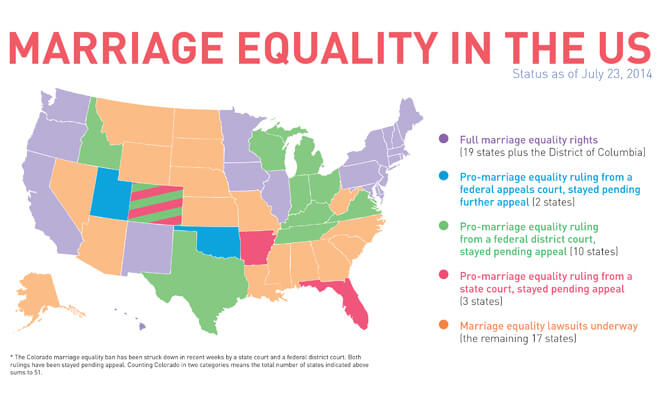Peter Renn, a senior attorney in Lambda Legal's Los Angeles office, led the team of attorneys who prevailed in a federal court in Idaho. | LAMBDALEGAL.ORG
US Magistrate Judge Candy Dale in Boise, Idaho, has ordered the state of Idaho to allow transgender people born there to obtain birth certificates correctly identifying them according to their gender identity. Once Idaho has complied with Dale’s March 5 order, the only states where trans people will remain unable to get appropriate new birth certificates will be Ohio, Tennessee, and Kansas, along with the Commonwealth of Puerto Rico, a US territory. The other 46 states and the District of Columbia have varying criteria for how transgender people can revise their birth certificates.
Dale ruled in a lawsuit filed by Lambda Legal on behalf of two transgender women born in Idaho whose birth certificates identify them as male with the males name given them at birth.
One, F.V., states that “she knew from approximately six that she was female” and she “began to live openly as a female when she was 15 years old.” She has transitioned “both medically and socially” and has gotten a legal name change, which she then used to get a new driver’s license, passport, and Social Security card. However, when she contacted the Idaho Bureau of Vital Records and Health Statistics within the Idaho Department of Health and Welfare to get a new birth certificate, she was told that the Bureau “does not consider such applications.”
Federal court finds existing policy is discrimination based on sex
According to Dale’s opinion, “F.V. asserts that living with a birth certificate declaring she is male is a permanent and painful reminder that Idaho does not recognize her as she is — as a woman. Beyond this, she states that presenting an identity document that conflicts with her gender identity is both humiliating and dangerous: it puts her at risk of violence by disclosing against her will and intentions that she is a transgender individual.”
The other plaintiff, Dani Martin, has a similar story, having known from an early age she was female despite her birth name and anatomy. “Fear of rejection and bullying prevented her from coming out when she was younger,” Dale wrote. With support from her spouse and family she began to transition in 2014 and has lived as a woman since then, taking steps both medically and socially to “bring her body and expression of gender in line with her female identity.”
Like F.V., Martin legally changed her name and obtained a new driver’s license and Social Security card, but the state’s policy blocked her from getting a new birth certificate, which, she claims, “has exposed her to harassment and embarrassment,” and has “prevented her from making the change in other important records.”
Lambda’s complaint charged that Idaho’s policy against issuing new birth certificates violates the US Constitution’s First Amendment and the due process and equal protection clauses of the 14th Amendment. Dale confined her ruling to the equal protection claim.
Any law or policy that systematically treats people differently based on any characteristic requires a rational, non-discriminatory justification. In this lawsuit, the state conceded that there was no rational basis for refusing to issue the requested certificates, but such changes are not specifically authorized under Idaho’s vital statistics statute and evidently the state’s political leadership lacked the willingness to amend the law. Theoretically, the executive branch could change the policy by adopting a new rule, but apparently it was not willing to take whatever political heat it thought that would generate. In effect, the state’s response to the lawsuit was to ask the court to issue an order, so that officials could refute any legislative criticism by putting the blame on the courts.
Idaho does issue new birth certificates for a variety of reasons, including correcting factual errors made at birth, adding the name of the father for infants born to unmarried women in response to an acknowledgement or determination of paternity, and changing names and paternal and maternal information resulting from adoptions. In those cases, “the vital statistics laws require the amendments not be marked or noted on the birth certificate.”
However, other changes not specifically authorized by the statute fall under a “catch-all” provision in the law, which requires that they “must be described on the birth certificate.” Since including such information on a new certificate for a transgender person would effectively out them when presenting the certificate as circumstances required, the lawsuit sought to ensure that the requested certificates appear completely ordinary on their face, with no indication of amendment or special circumstances.
The only real dispute between the parties was whether the court should go beyond the state’s concession that it had no rational policy justification for denying new birth certificates for transgender people, to determine whether gender identity itself is a “suspect classification,” imposing on the state a high level of justification for its practice. Idaho officials urged Judge Dale not to do that, but the plaintiffs, concerned about the possibility that the state might come up with a new rule imposing costly barriers to obtaining the new licenses — such as a requirement for complete surgical transition, which is still the rule in many other states — asked Dale to apply a more demanding level of judicial review in evaluating any such rule.
Siding with the plaintiffs, Dale extended her opinion to provide a detailed discussion of gender identity and its status under federal constitutional law, concluding that heightened scrutiny should be applied. After reviewing advances in the understanding of human sexuality, she wrote, “to conclude discrimination based on gender identity or transsexual status is not discrimination based on sex is to depart from advanced medical understanding in favor of archaic reasons.” Under binding Supreme Court precedents, discrimination because of sex requires heightened scrutiny.
Furthermore, Dale found, gender identity or transgender status should be treated the same way that the Ninth Circuit — whose jurisdiction includes Idaho — has treated sexual orientation or homosexual status.
“The pervasive and extensive similarities in the discrimination faced by transgender people and homosexual people are hard to ignore,” she wrote. “(1) Transgender people have been the subject of a long history of discrimination that continues to this day; (2) transgender status as a defining characteristic bears no ‘relation to ability to perform or contribute to society;’ (3) transgender status and gender identity have been found to be ‘obvious, immutable, or distinguishing characteristics;’ and (4) transgender people are unarguably a politically vulnerable minority.”
Dale continued, “This is especially true in Idaho, where transgender people have no state constitutional protections from discrimination based on their transgender status in relation to employment decisions, housing, and other services. Therefore, transgender people bear all of the characteristics of a quasi-suspect class and any rule developed and implemented by IDHW should withstand heightened scrutiny review to be constitutionally sound.”
This would mean that any new requirement imposed by the state and challenged by transgender plaintiffs would have to be supported by an important government interest that the requirement substantially advances. Under this standard, it is unlikely that a surgical requirement would withstand judicial review, since many states — and countries — have come to agree that such a requirement poses an unnecessary barrier to the ability of many transgender people to obtain appropriate official documentation, without serving any significant public purpose.
Dale issued an injunction giving the state up to one month to “begin accepting applications made by transgender people to change the sex listed on their birth certificates,” and specifying that the new certificates “must not include record of amendment to the listed sex” and should use the new legal name of the applicant.
The plaintiffs are represented by Lambda Legal attorneys Peter Renn and Kara Ingelhart, with pro bono local counsel Monica G. Cockerille of Boise, Idaho.




































